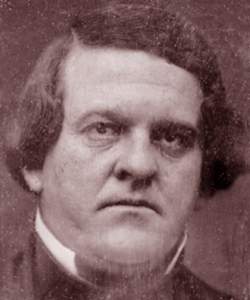Howell Cobb (American National Biography)
Scholarship
At the first national party nominating convention at Charleston, South Carolina, in April [1860], Cobb did not emerge as a serious contender; when, in the wake of that deadlocked meeting, a second convention assembled at Baltimore in June, Stephen Douglas refused to withdraw his candidacy in favor of a Cobb nomination, and Cobb refused to seek a compromise alternative. Cobb's own chances dissolved when bolters from the main Baltimore meeting turned instead to Vice President John C. Breckinridge as their choice. Although Cobb supported Breckinridge, Republican Abraham Lincoln won the election.
Cobb's commitment to the preservation of the Union had eroded during the 1850s, in part because the course of politics rendered his original stance unfeasible if he was to pursue a political career. By 1860 his desire for advancement led him to advocate measures that contributed to the disruption of his once-beloved Democratic party. In the aftermath of Lincoln's victory, Cobb went back on his Unionist principles and supported secession. He resigned his cabinet post on 10 December 1860; on his return to Georgia, he spoke on behalf of immediate secession. Although he was not a delegate to the January 1861 secession convention, he attended its discussions; the next month he served as one of Georgia's representatives to the Montgomery Convention, which established the Confederate States of America.
Cobb's commitment to the preservation of the Union had eroded during the 1850s, in part because the course of politics rendered his original stance unfeasible if he was to pursue a political career. By 1860 his desire for advancement led him to advocate measures that contributed to the disruption of his once-beloved Democratic party. In the aftermath of Lincoln's victory, Cobb went back on his Unionist principles and supported secession. He resigned his cabinet post on 10 December 1860; on his return to Georgia, he spoke on behalf of immediate secession. Although he was not a delegate to the January 1861 secession convention, he attended its discussions; the next month he served as one of Georgia's representatives to the Montgomery Convention, which established the Confederate States of America.
Brooks D. Simpson, "Cobb, Howell," American National Biography Online, February 2000, http://www.anb.org/articles/03/03-00104.html.
Howell Cobb (Congressional Biographical Directory)
Reference
COBB, Howell, (nephew of Howell Cobb [1772-1818]), a Representative from Georgia; born at “Cherry Hill,” Jefferson County, Ga., September 7, 1815; moved with his father to Athens, Ga., in childhood; was graduated from Franklin College (then a part of the University of Georgia), at Athens in 1834; studied law; was admitted to the bar and commenced practice in Athens, Ga., in 1836; solicitor general of the western judicial circuit of Georgia 1837-1841; elected as a Democrat to the Twenty-eighth and to the three succeeding Congresses (March 4, 1843-March 3, 1851); chairman, Committee on Mileage (Twenty-eighth Congress); Speaker of the House of Representatives (Thirty-first Congress); Governor of Georgia 1851-1853; elected to the Thirty-fourth Congress (March 4, 1855-March 3, 1857); Secretary of the Treasury in the Cabinet of President Buchanan and served from March 6, 1857, to December 10, 1860, when he resigned; chairman of the convention of delegates from the seceded States which assembled in Montgomery, Ala., on February 24, 1861, to form a Confederate Government; appointed a brigadier general in the Confederate Army February 13, 1862, and promoted to major general September 9, 1863; surrendered at Macon, Ga., April 20, 1864; died in New York City October 9, 1868; interment in Oconee Cemetery, Athens, Clarke County, Ga.
“Cobb, Howell,” Biographical Directory of the United States Congress, 1774 to Present, http://bioguide.congress.gov/scripts/biodisplay.pl?index=C000548.



